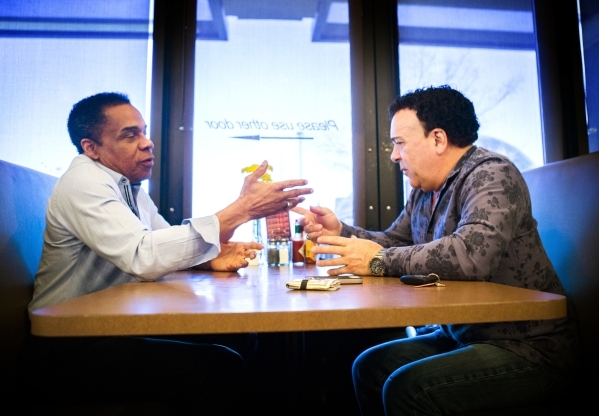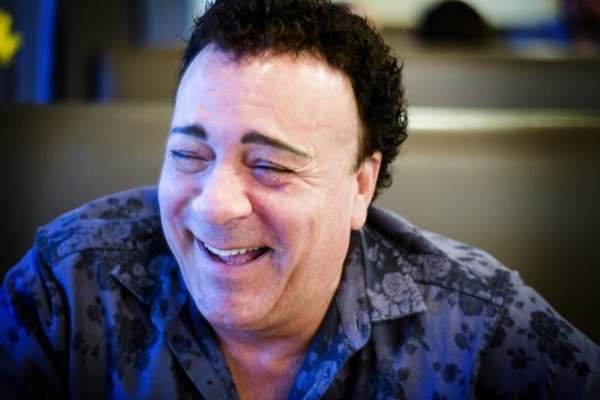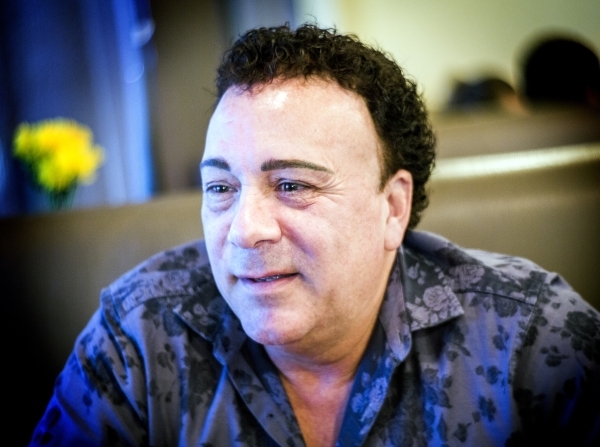Are old-school entertainers a dying breed?
How do you define an old-school entertainer?
Maybe it's like that old definition of pornography: You know it when you see it.
And this weekend brings back two Las Vegas favorites who have been harder to see close to home. Given the current drift, the Scintas and Earl Turner found it easier to spend more time on the road or cruise ships than to fight the battle of sustaining a year-round berth on the Strip.
But Turner plays the South Point Friday through Sunday, and the Scintas move into the retro showroom at the Plaza with shows Friday, Saturday and select dates through May.
We decided to get Turner and Frank Scinta together at a coffee shop and ask them what it means to be a "showman" versus a "singer," and whether they feel they are the last of the breed in the era of instant YouTube fame.
Midway through, the two speakerphoned mutual friend and fellow down-front performer Clint Holmes; he was in Florida for one of those road dates but returns to his Cabaret Jazz berth at The Smith Center for the Performing Arts on April 8.
One thing was immediately clear: Get these guys together and you don't have to ask many questions. (Here are the edited highlights of their conversation.)
It's a DJ's world
The nightclubs have replaced the old Las Vegas lounge scene, once the proving ground of up-and-coming entertainers. And while Americans have turned singing into a sport thanks to "American Idol" and "The Voice," the pop music they actually buy favors DJ-producers and electronically processed vocals.
Scinta: We used to laugh at those (DJ) guys. When we did gigs they'd play in between the shows. They were the guys that had no talent and would spin records. And then they got fancy with the — (makes scratching sound) — what's that called?
Turner: Scratching. I understand it because it's a different industry now. What they do is artistic in this world, in this day and time ... . But it's not what we call entertainment.
Scinta: Kids are coming up not doing the lounges, working those and honing their talent. They're coming right into a record deal and then they're thrown out into the world with nothing to perform, except their one hit song.
Holmes: There's no proving ground. No lounge where you work five shows a night and you learn the craft. It's harder. It's a lot harder. Even some of the great stars aren't necessarily great onstage.
(Holmes did have a Top 40 single, "Playground in My Mind", in 1973).
Holmes: But I was already out there performing four years before I had my record. That's how the guy who recorded me heard me. I was doing three shows a night in a lounge in the Bahamas.
Scinta: So when you stepped on that stage after that hit, you had a whole show to follow up that hit.
Holmes: We learned the craft. Somehow we knew that no matter whether we had a hit record or not, this is what we were going to do with our lives. So we learned how to do it. We learned how to entertain people.
An entertainer defined
For decades in Las Vegas showrooms, a hit single or two might lure audiences in, but it was the performance value that sustained them. What's the difference between an "entertainer" and a "recording artist" that might not be understood by, say, Britney Spears fans who turn out for a dance-through of her hits?
Turner: We grew up in a time when show business, as an artist, you had to be entertaining. We grew up in the Sammy Davis era. You had to have a story. You had to come prepared to have people spend an evening with you that made them feel something.
An entertainment experience is one where you come out changed. I don't mean permanently changed, but you come out differently than when you went in. You came out and you're excited.
People always say when they come to see me perform, "I was surprised that you were funny. I laughed."
Scinta: That's the thing about guys like Earl. He's not just a singer, he's not just a dancer or a comedian. When we learned to entertain, you had to do everything. You had to hone your talent. You just didn't come up and get a record break and — bang! — you're a star.
Adele is incredible. Right now, she's on top of the world. But that's what she's going to do: She's going to sing that whole show. She's a great singer, but she's not an entertainer.
We live in a life where people stand in front of a microwave oven and say, 'Hurry up.' If you can touch their heart and make them laugh? Laughter, I think, is a big key to getting into somebody's heart. If you can reach their heart, you've got an audience that's gonna love you for the rest of your life.
Turner: Here's the difference that shows you what a real entertainer looks like: If you can take that person and put him on the stage with a single instrument, no special lighting, nothing fancy. Or, even better yet, have the power go out. Now, keep me entertained while they fix that. That's the definition. If that person can entertain you, that's the difference.
A new song
Two songs kept coming up in the conversation: The ubiquitous Mark Ronson-Bruno Mars tune "Uptown Funk" and John Legend's "All of Me." It was clear our trio of entertainers would love to keep up with contemporary pop if contemporary pop would give them more to keep up with.
Scinta: Remember when you'd hear a song on the radio like Stevie Wonder? Nobody writes them anymore. Those big Whitney Houston ballads, they're gone. Big ballads that would just make you go, "Oh my God." Nobody writes them anymore.
Turner: They'll write a ballad where if you double the time on it, it equals 128 beats a minute. Why? Because they want a DJ to be able to take that ballad and turn it into a dance song. They write songs according to tempo so they can be cross-marketed.
I'll tell you something else, too. The new songs, their life span is not very long. I started doing 'All of Me' when it first came out. All we'd have to do is start it (to get a reaction). But now, it's not like doing 'Yesterday', or (sings) "You never close your eyes ..."
Holmes: Some of it is absolutely disposable. I think that's true of any era. But I think there are the John Mayers and the John Legends who aren't. I think those songs, some of them will stand the test of time.
The jury's out on some of these people. I don't think we know yet. I just remember that when I was a kid, my mom was trying to make me listen to her music, and I was listening to Dion and the Belmonts and Danny and the Juniors and Frankie Valli. And they didn't think that was very good music, but now we have "Jersey Boys" and Elvis is alive in so many ways. My parents thought that was totally disposable.
Why they do it
Turner: We have that sixth sense. I can tell when people are sad; I can feel when a guy is jealous. We pick up on all that. That's how we work.
Scinta: I think other singers just look straight ahead.
Turner: I had one guy say to me, how did you do that show with those few people in there? I never see an empty seat. You look for the seats that people are in, that's all that matters.
Scinta: If there's two drunks there, I'm gonna play like they're 2,000.
Holmes: I need what I do. If I didn't have that release of getting out there, getting the applause, feeling the energy between the band and myself. All of that big huge wonderful thing that makes us happen. If I didn't have that ...
Scinta: I need to be there. That's exactly right, Clint. We live to do what we do, that's the thing. It's never been a job to me. It's like our blood, like filling our veins. I live to be on that stage.
Holmes: There's a great deal of gratitude that goes into it. When we get ready to go onstage, we're grateful that we get to do what we love to do.
Turner: I have a job where I actually get applauded for doing what I do. Wouldn't you like to have a job where somebody comes over to your desk and claps? How many people experience that in their workplace?
— Read more from Mike Weatherford at reviewjournal.com. Contact him at mweatherford@reviewjournal.com and follow @Mikeweatherford on Twitter.


































